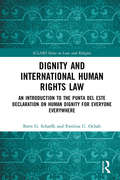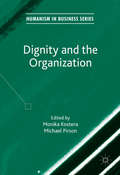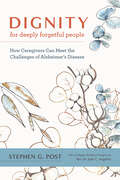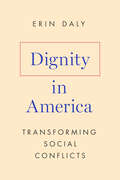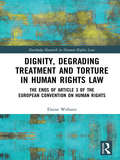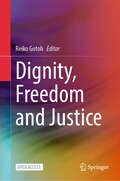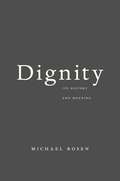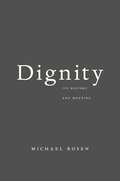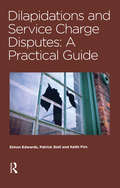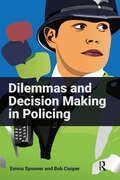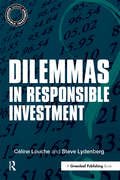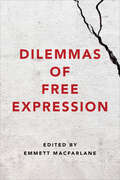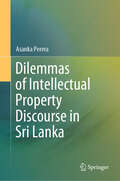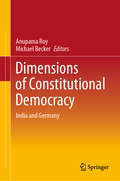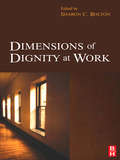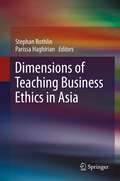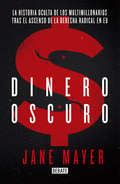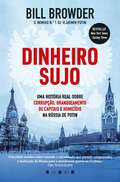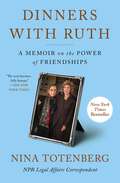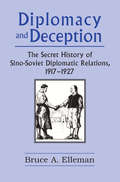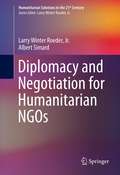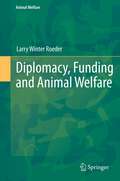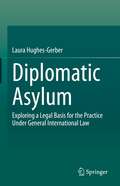- Table View
- List View
Dignity and International Human Rights Law: An Introduction to the Punta del Este Declaration on Human Dignity for Everyone Everywhere (ICLARS Series on Law and Religion)
by Brett G. Scharffs Ewelina U. OchabThe Punta del Este Declaration, and this book dedicated to elaborating upon it, is devoted to exploring the ways that human dignity for everyone everywhere can be a useful tool in helping to address the challenges and strains facing human rights in the world today. In 2018, an initiative was instigated to revitalize the human rights project by way of engaging the notion of human dignity. This resulted in the Punta Del Este Declaration on Human Dignity for Everyone Everywhere (Punta Del Este Declaration), a declaration co-authored by over 30 human rights experts from all over the world. The Punta Del Este Declaration simplifies and brings coherence to the concept of human dignity in 10 brief statements that capture the many dimensions and aspects of human dignity and the practical ways that human dignity is useful in the promotion of human rights. This book provides an overview of how the notion of human dignity has been used to strengthen human rights. It discusses how human dignity playsmany different roles in human rights discourse and has the force to revitalize the human rights project; it is the foundational principle upon which the human rights project is built. But it is also the telos, or end goal, of human rights. At the same time, it is an important evaluative mechanism for assessing how well a country is doing in the implementation of human rights. The book will be a valuable resource for all those working in the areas of International Human Rights Law, Legal Philosophy, and Law and Religion.
Dignity and the Organization (Humanism in Business Series)
by Monika Kostera and Michael PirsonThis important book focuses on the role of human dignity, its protection and promotion in the context of organization and Humanistic Management. The recent phenomenon of humanism in management already has a rich body of literature and takes up many themes both theoretically, and from a practitioner perspective. Dignity and the Organization is the first book to explicitly deal with the topic of human dignity and management. The chapters address various aspects and problems from a humanistically-oriented perspective, taking up issues relevant for the contemporary management theorists and practitioners, and are concerned with organization, management and the social and cultural context. The book develops the notion of human dignity in conceptual and theoretical terms in its practical application, within the context of organizations.
Dignity for Deeply Forgetful People: How Caregivers Can Meet the Challenges of Alzheimer's Disease
by Stephen G. PostFor caregivers of deeply forgetful people: a book that combines new ethics guidelines with an innovative program on how to communicate and connect with people with Alzheimer's.How do we approach a "deeply forgetful" loved one so as to notice and affirm their continuing self-identity? For three decades, Stephen G. Post has worked around the world encouraging caregivers to become more aware of—and find renewed hope in—surprising expressions of selfhood despite the challenges of cognitive decline. In this book, Post offers new perspectives on the worth and dignity of people with Alzheimer's and related disorders despite the negative influence of "hypercognitive" values that place an ethically unacceptable emphasis on human dignity as based on linear rationality and strength of memory. This bias, Post argues, is responsible for the abusive exclusion of this population from our shared humanity. With vignettes and narratives, he argues for a deeper dignity grounded in consciousness, emotional presence, creativity, interdependence, music, and a self that is not "gone" but "differently abled." Post covers key practical topics such as: • understanding the experience of dementia• noticing subtle expressions of continuing selfhood, including "paradoxical lucidity" • perspectives on ethical quandaries from diagnosis to terminal care and everything in between, as gleaned from the voices of caregivers• how to communicate optimally and use language effectively • the value of art, poetry, symbols, personalized music, and nature in revealing self-identity• the value of trained "dementia companion" dogsAt a time when medical advances to cure these conditions are still out of reach and the most recent drugs have shown limited effectiveness, Post argues that focusing discussion and resources on the relational dignity of these individuals and the respite needs of their caregivers is vital. Grounding ethics on the equal worth of all conscious human beings, he provides a cautionary perspective on preemptive assisted suicide based on cases that he has witnessed. He affirms vulnerability and interdependence as the core of the human condition and celebrates caregivers as advocates seeking social and economic justice in an American system where they and their loved ones receive only leftover scraps. Racially inclusive and grounded in diversity, Dignity for Deeply Forgetful People also includes a workshop appendix focused on communication and connection, "A Caregiver Resilience Program," by Rev. Dr. Jade C. Angelica.
Dignity in America: Transforming Social Conflicts
by Erin DalyHow a focus on dignity transforms, and resolves, some of the country's most pressing social problems. Dignity represents the inherent and equal worth of each one of us. It is how we think about the value of our lives. It is how we think about justice, and about the injustices that cause people to struggle and suffer. In Dignity in America, Erin Daly explores how we can resolve the social conflicts that divide us as a nation by transforming them under the lens of human dignity. It may apply differently in different cultural settings, but the core meaning of dignity is both intuitive and universal. It stands for a set of interlocking ideas that focus on each person's need to freely develop their full personality and identity. Using the language of dignity that has already taken root in international law and courts all around the world, Daly shows us how to think about controversies, ranging from affirmative action to abortion to climate justice to democracy, with a view toward enhancing our ability to live with dignity. Daly presents dignity as a universal value that transcends partisan debates and, in many cases, presents a clear path to the most just solutions to the conflicts that divide us as a nation. She introduces the American voting public to the idea of dignity by posing and wrestling with a series of questions: How can we insist on a politics that really protects human dignity? How can we use the idea of dignity to guide us toward solutions that allow more people to live each day with more of it? If we pay attention to the core needs of people in society, we can make political choices that better protect us all, allowing us to flourish as individuals while living in communities based on justice for all.
Dignity, Degrading Treatment and Torture in Human Rights Law: The Ends of Article 3 of the European Convention on Human Rights (Routledge Research in Human Rights Law)
by Elaine WebsterAlthough scholars have shown longstanding interest in the boundaries of interpretation of the right not to be subjected to torture and other prohibited harm, the existing body of work does not sufficiently reflect the significance of the interpretive scope of degrading treatment. This book argues that the degrading treatment element of the right is a crucial site of analysis, in itself and for understanding the parameters of the right as a whole. It addresses how, methodologically, the scope of meaning and application of the right not to be subjected to degrading treatment should best be identified and considers the implications thereof. It systematically examines the diverse aspects of degrading treatment’s scope, from foundations of legal interpretation to the drivers of humiliation. It draws on wide-ranging literature and extensive analysis of more than 1,500 judgments of the European Court of Human Rights, which has pioneered the right’s interpretive growth. The book aims to explore how the interpretive possibilities, and limits, of the right not to be subjected to degrading treatment turn upon the axes of human dignity and state responsibility, and aims to show how this right’s protection can be achieved as well as limited through processes of interpretation. Dignity, Degrading Treatment and Torture in Human Rights Law provides interpreters with analytical tools to advance the application of the right not to be subjected to torture, cruel, inhuman or degrading treatment or punishment in international, regional and domestic human rights law. It will appeal to all who have an interest in understanding the right’s meaning, development, and potential scope of application, as well as those with an interest in methodologies of human rights interpretation.
Dignity, Freedom and Justice
by Reiko GotohThis is an open access book.Modern society is characterized by the fact of contingency, uncertainty, and ambiguity. The purpose of this book is to transform this phenomenal fact into a hopeful norm. As a clue, the book examines the concept of dignity and looks forward to a new definition. So far, the concept of dignity has been peripheral to the concerns of liberal social sciences. This book uses the concept of dignity as a source of light to illuminate the fundamental critique of liberal social sciences and philosophy. Can the theory of justice or discourse ethics truly realize the well-defined society it envisions in a fundamentally contingent, uncertain, and ambiguous situation? Can societies be inclusive of minorities relegated to the periphery with their dignity undermined? Can we resist the temptation to construct huge hierarchical stairs, forcing individuals to place themselves on one of its steps, and thus lining up different and diverse entities in along sequence, and eventually bringing about totalitarianism? This book has a three-level telescopic structure. At the very front, there is a scope of reexaming the political liberalism in the light of dignity. Behind it is a scope of reconstructing a theory of justice in modern society. Further behind it, there is a scope encompassing reflection on the methodology of liberal social sciences and philosophy. We leave it to the reader's imagination as to which scope to read this book through, and what image will emerge from the three scopes taken together. It is our hope that this book helps readers envision as a "realistic utopia" a society in which "no one is left behind," including wounded little birds.
Dignity: Its History and Meaning
by Michael RosenDignity plays a central role in current thinking about law and human rights, but there is sharp disagreement about its meaning. Combining conceptual precision with a broad historical background, Michael Rosen puts these controversies in context and offers a novel, constructive proposal. “Penetrating and sprightly…Rosen rightly emphasizes the centrality of Catholicism in the modern history of human dignity. His command of the history is impressive…Rosen is a wonderful guide to the recent German constitutional thinking about human dignity…[Rosen] is in general an urbane and witty companion, achieving his aim of accessibly written philosophy.” —Samuel Moyn, The Nation “[An] elegant, interesting and lucid exploration of the concept of dignity...Drawing on classical, liberal and Catholic traditions, Rosen hopes to rehabilitate dignity to its rightful place near the centre of moral thought...Rosen's admirable book deserves wide attention from political theorists, jurisprudes and political philosophers.” —Simon Blackburn, Times Higher Education “Dignity deserves to be widely read, not only for its intrinsic interest, but also as a corrective to the habit of discussing such topics in abstraction from their social context. Whether or not one agrees with Rosen's arguments, there can be no doubt he has widened our horizons.” —Rae Langton, Times Literary Supplement
Dignity: Its History and Meaning
by Michael RosenDignity plays a central role in current thinking about law and human rights, but there is sharp disagreement about its meaning. Combining conceptual precision with a broad historical background, Michael Rosen puts these controversies in context and offers a novel, constructive proposal.“Penetrating and sprightly…Rosen rightly emphasizes the centrality of Catholicism in the modern history of human dignity. His command of the history is impressive…Rosen is a wonderful guide to the recent German constitutional thinking about human dignity…[Rosen] is in general an urbane and witty companion, achieving his aim of accessibly written philosophy.”—Samuel Moyn, The Nation“[An] elegant, interesting and lucid exploration of the concept of dignity...Drawing on classical, liberal and Catholic traditions, Rosen hopes to rehabilitate dignity to its rightful place near the centre of moral thought...Rosen's admirable book deserves wide attention from political theorists, jurisprudes and political philosophers.”—Simon Blackburn, Times Higher Education“Dignity deserves to be widely read, not only for its intrinsic interest, but also as a corrective to the habit of discussing such topics in abstraction from their social context. Whether or not one agrees with Rosen's arguments, there can be no doubt he has widened our horizons.”—Rae Langton, Times Literary Supplement
Dilapidations and Service Charge Disputes: A Practical Guide
by Simon Edwards Patrick Stell Keith FirnWritten by three surveyors, each with extensive experience in the sector, Dilapidations and Service Charge Disputes will guide practitioners through the common and new practices involved in dealing with disputes on dilapidations and service charge matters. The book offers practical guidance on the related topics of dilapidations and service charge disputes, bridging the gap between heavy-weight legally focussed case law publications and the lighter weight guidance notes. It offers practical and theoretical advice that will be invaluable to any surveyor or solicitor dealing with: condition reports prior to a lease agreement litigation avoidance advice dilapidations law and precedent. Beneficial to surveyors and solicitors acting on behalf of tenants or landlords, this book provides the information and practical advice that can help you improve in your role.
Dilemmas and Decision Making in Policing
by Emma Spooner Bob CooperExplores how policing students and police officers might apply theory to tackle dilemmas demonstrated through true to life scenarios.Relevant for those undertaking the Professional Policing degree, Apprenticeships or the Degree Holder Entry Programme, as well as their academic and work-based educators, it examines the complexities faced on a daily basis by frontline officers. A range of fictional realistic case studies are presented in order to highlight contemporary challenges in the modern policing landscape. These are unpicked through discussion and reflective questions, exploring how decisions are made based on theoretical understanding and practical considerations in context. Key themes within these scenarios include procedural justice, legitimacy, organisational culture, prioritisation of workload, objectivity and neutrality, human rights and values. The book provides students and their educators with the opportunities to discuss policing dilemmas and decision-making in a safe space.
Dilemmas in Responsible Investment (The Responsible Investment Series)
by Céline Louche Steve LydenbergImagine that you are a responsible investment money manager. One of your clients is asking you to sell her holdings in a company because it has been accused in the press of contracting with suppliers that have abusive labour conditions. You have to evaluate and benchmark the CSR performance of a number of companies from the same industry but among them there are companies, primarily the smallest, that provide little or no CSR information. One of your major clients is asking you to exclude companies involved in nanotechnology What would you do? Responsible investment (RI) – the integration of environmental, societal and governance (ESG) issues into investment decision-making – can be difficult and complex. Including or excluding companies, engaging with companies, partnering with stakeholders, evaluating environmental and societal controversies, defining criteria and, all the while, producing a competitive return for investors can raise multiple questions that cannot be dealt with simply. The practice of RI faces many such dilemmas as it seeks to balance the competing goals of business, society, and finance and to judge how best to reconcile what are often conflicting concerns. Dilemmas in Responsible Investment examines the problems responsible investment practitioners face daily. It emphasises the importance of asking the right questions as well as getting the right answers; and the importance of process as well as product. The authors pay attention to the diversity of opinion and variety of approaches available. They also raise fundamental questions about the very purpose of investment and the responsibilities of investors, both economic and societal. Although dilemmas in RI are not always easily resolved, Louche and Lydenberg believe that they are also a source of valuable and necessary debate about the appropriate role of corporations in society and the ability of the financial markets to appropriately serve the societies in which they operate. Such dilemmas provide a valuable framework for public debate and can encourage the emergence of innovative answers and approaches. Responsible investors join in these debates when they examine the societal and environmental implications of business activities, actions and behaviour Facilitate dialogue between corporations and their stakeholders Encourage corporate transparency on societal and environmental issues Reward companies that are making genuine efforts towards sustainability Integrate societal and environmental data into financial analysis. The book first of all provides a state-of-the-art overview of responsible investment, its history and development, explanations of key terms and a guide to the different actors involved in the field. Second, it presents 12 diverse hypothetical case studies that examine a wide spectrum of the challenges facing RI professionals, raising questions about the relationship between business and society, about the purpose of investment, and about the responsibilities of investors to various segments of society and the environment. The (often interconnected) cases present a dilemma, possible approaches available, variable factors, a variety of quotations and suggested responses from 35 leading professionals in the responsible investment community, real-world examples and comparisons and recommendations. Accessible, vivid and illuminating, Dilemmas in Responsible Investment is the first book specifically written for teaching and professional training in responsible investment. It will be required reading for students, academics and practitioners in the areas of finance, ethics and CSR.
Dilemmas of Free Expression
by Emmett MacfarlaneFree expression is under threat. Social media and "fake news," misinformation, and disinformation have prompted governments to propose new forms of regulation that are deeply challenging to free expression. Hate speech, far-right populism, campus speech debates, and censorship consistently make headlines in Canada and abroad. Dilemmas of Free Expression offers forward-looking appraisals of ways to confront challenging moral issues, policy problems, and controversies that pay heed to the fundamental right to free expression. The essays in this volume offer timely analyses of the law, policy, and philosophical challenges, and social repercussions to our understanding of expressive freedom in relation to government obligations and public discourse. Free expression and its limits are multifaceted, deeply complex, inherently values-based, and central to the ability of a society to function. Dilemmas of Free Expression addresses the challenges of limiting free expression across a host of issues through an analyses by leading and emerging voices in a number of disciplines, including political science, law, philosophy, and Indigenous studies.
Dilemmas of Intellectual Property Discourse in Sri Lanka
by Asanka PereraThis book examines global and national lawmaking in Sri Lanka through three case studies: patent examination, plant variety laws, and technology innovation. It evaluates how various lawmakers influence intellectual property law to support innovation and development in Sri Lanka. The book explores Sri Lanka’s intellectual property laws and the mismatch between its international obligations, such as Trade Related Aspects of Intellectual Property Agreement (TRIPS), and the Patent Cooperation Treaty (PCT), and their implementation. It examines the repercussions of this mismatch and provides insights for the future of Sri Lanka and other small developing countries. Based on socio-legal research, the book reveals the nature of local and global discourses and the lawmaking processes regarding intellectual property in Sri Lanka. While international law advocates strong standards for inventiveness in patent examination, plant breeders’ rights, and technology transfer to support high-tech development, Sri Lanka has been reluctant to implement such laws. This book is a crucial resource for researchers, policymakers, and legal professionals interested in intellectual property law, innovation ecosystems, and the socio-legal aspects of lawmaking in developing countries.
Dimensions of Constitutional Democracy: India and Germany
by Anupama Roy Michael BeckerThis book examines a selection of themes that have become salient in contemporary debates on constitutional democracies. It focuses in particular on the experiences of India and Germany as examples of post-war and post-colonial constitutional democracies whose trajectories illustrate democratic transitions and transformative constitutionalism. While transformative constitutionalism has come to be associated specifically with the post-apartheid experience in South Africa, this book uses the transformative as an analytical framework to transcend the dichotomy of west and east and explore how temporally coincident constitutions have sought to install constitutional democracies by breaking with the past. While the constitution-making processes in the two countries were specific to their political contexts, the constitutional promises and futures converged. In this context, the book explores the themes of Constitutionalism, Nationalism, Secularism, Sovereignty and Rule of Law, Freedoms and Rights, to investigate how the contestations over democratic transitions and democratic futures have unfolded in the two democracies. It offers readers valuable insights into how the normative frameworks of constitutional democracy take concrete form at specific sites of democratic and constitutional imagination in Dalit and Islamic writings, as well as the relationship between state and religion in the writings of public intellectuals, political and legal philosophers. The book also focuses on specific sites of contestation in democracies including the relationship between sovereignty and citizenship in post-colonial India, free speech and sedition in liberal democracies, questions of land rights in connection with economic and political changes in contemporary contexts, and the rights of indigenous communities with regard to international conventions and domestic law. Given its scope, it will be of interest to students and scholars of political theory, political philosophy, comparative constitutionalism, law and human rights.
Dimensions of Dignity at Work
by Sharon C. BoltonWhat is dignity in and at work? How is it experienced differently by different groups of working people?Are there enduring divisions of dignity: unequal access to what is accepted to be a fundamental human right?How can we ensure that continued opportunities are available for the creation, maintenance and restoration of dignity at work?This edited collection of papers investigates the concept of dignity and what it means to people in their working lives: how we are perceived and valued as people in the workplace.Contributors to over a century of social and organizational analysis have talked about dignity at work, but the discussion has tended to take place under headings such as citizenship, satisfaction, mutuality, pride in work, responsible autonomy and ontological security, or to focus on mismanagement, over-long hours, a poor working environment, workplace bullying and harassment as the central facilitator of indignity at work.Dignity in and at work is a far more complex phenomenon than these representations would suggest. Neither is it enough to suggest that equal opportunity, work life balance and anti-bullying policies restore dignity to work, valuable interventions though they are in themselves. The papers featured in this edited collection suggest that we see dignity reordered and experienced in different ways depending on our own circumstances and viewpoints.
Dimensions of Politics and English Jurisprudence
by Sean CoyleUnderstandings of law and politics are intrinsically bound up with broader visions of the human condition. Sean Coyle argues for a renewed engagement with the juridical and political philosophies of the Western intellectual tradition, and takes up questions pondered by Aristotle, Plato, Augustine, Aquinas and Hobbes in seeking a deeper understanding of law, politics, freedom, justice and order. Criticising modern theories for their failure to engage with fundamental questions, he explores the profound connections between justice and order and raises the neglected question of whether human beings in all their imperfection can ever achieve truly just order in this life. Above all, he confronts the question of whether the open society is the natural home of liberals who have given up faith in human progress (there are no ideal societies), or whether liberal political order is itself the ideal society?
Dimensions of Teaching Business Ethics in Asia
by Parissa Haghirian Stephan RothlinA growing number of higher education institutions in Asia are now integrating ethics courses in their curricula. But the challenge remains to develop courses that can effectively reach their objectives, and to create and use teaching materials appropriate to the particular profile of the students and executives in different regions and cultures. In this context, enhancing awareness for ethical dilemmas, proposing frameworks and models to help managers handle difficult choices and demanding decisions - while not being moralistic and imposing values - , and presenting alternative approaches through recent and relevant cases are the main objectives of this book. It examines teaching methods, learning tools and pedagogical methods effective in the teaching of ethics within the particular context of the rich diversity of Asian cultures, and discusses ethics courses curricula, aiming at developing the capacity to deal with a number of issues such as corruption, intellectual property protection, whistle blowing and consumer rights. The relevance and limits of Asian philosophical and spiritual traditions and how their underlying values can be a meaningful aspect in the teaching of ethics to managers and business leaders are explored, as are the benefits and limits of corporate codes of conduct and ways to enhance their effectiveness. A similar approach is taken to the introduction of "oaths" and "ethics pledges" among business students, which has been promoted in some business schools.
Dinero oscuro: La historia oculta de los multimillonarios tras el ascenso de la derecha radical
by Jane MayerIgual que en México, en Estados Unidos se compran elecciones... Ésta es la historia de cómo los hombres más poderosos del mundo lograron encumbrar a Donald Trump, a la mala. En esta poderosa investigación, la galardonada periodista Jane Mayer documenta cómo los multimillonarios estadounidenses lucharon -y consiguieron- adueñarse del sistema electoral de la nación más influyente del mundo. No conformes con disfrutar de uno de los tratos más privilegiados en el planeta, los potentados secuestraron la democracia de aquel país para sus propios fines, con una sofisticación inaudita y altamente efectiva. Este gran reportaje -y en este año- reviste especial relevancia para México, donde los empresarios y los políticos suelen imitar lo que hacen y perpetran sus homólogos de Estados Unidos#
Dinheiro Sujo: Uma História Real Sobre Corrupção, Branqueamento de Capitais e Homicídio na Rússia de Putin
by Bill BrowderUma história real sobre corrupção, branqueamento de capitais e homicídio na Rússia de Putin Em 2009, Sergei Magnitsky, advogado de Bill Browder, um dos maiores investidores estrangeiros da Rússia, é espancado até à morte numa prisão de Moscovo depois de expor um esquema de fraude fiscal praticado pelo governo russo. A procura de justiça para Sergei faz de Bill Browder o principal inimigo de poderosos oligarcas russos. Fora da Rússia, o autor e a sua equipa seguem o rasto do dinheiro roubado, vindo a descobrir que este teve como destino a Europa Ocidental e a América, e que Vladimir Putin é um dos beneficiários. Bill Browder convence, então, vários líderes políticos internacionais a aplicarem uma lei para sancionar os responsáveis de crimes contra os direitos humanos na Rússia, congelando os seus ativos. Porém, quando diferentes países começam a aplicar a lei e a congelar o dinheiro de oligarcas russos, a resistência do Kremlin aumenta e começam as retaliações. Vladimir Putin pode estar disposto a tudo para proteger o seu dinheiro, mas Bill Browder não se deixará intimidar, e nada o deterá até que a justiça seja feita. «Um relato verídico sobre extorsão e intimidação que permite compreender a motivação da Rússia para a monstruosa guerra na Ucrânia.» The Telegraph Um livro oportuno, tenso e cativante que está entre as melhoras obras publicadas recentemente sobre a Rússia.» The Time «Um livro obrigatório para quem quer entender as táticas da autocracia moderna.» ANNE APPLEBAUM, vencedora do Prémio Pulitzer, autora de Gulag e O Crepúsculo da Democracia «Um relato cativante de assassínios, batalhas legais e biliões de dólares. Seria um bom livro de ficção, mas é uma história verdadeira que serve como guia para lutar contra o crime e a corrupção da Rússia de Putin. Bill Browder mostra como um homem com coragem pode fazer a diferença. É uma mensagem inspiradora que é urgente serconhecida.» GARRY KASPAROV, autor de O Inimigo Que Vem do Frio «Um livro que oferece uma visão acessível sobre a verdadeira natureza do regime que é responsável pelos horrores na Ucrânia relatados diariamente.» The Sunday Times «Um trabalho essencial de alguém que sabe bem até onde irão funcionários e empresários russos corruptos para defender a sua riqueza ilícita. Dinheiro Sujo não é apenas uma boa leitura — é um lembrete da urgência de enfrentar a praga global da lavagem de dinheiro.» The Washington Post «Um livro que não poderia ser mais oportuno para explicar por que motivo o apoio dos oligarcas da Rússia e os seus fundos se tornaram cruciais para a base de poder de Putin.» The Independent «Uma denúncia impressionante que revela até que ponto Putin e os seus comparsas estarão dispostos a ir para ocultar os seus crimes e punir aqueles que os acusam.» Publishers Weekly
Dinners with Ruth: A Memoir on the Power of Friendships
by Nina TotenbergCelebrated NPR correspondent Nina Totenberg delivers an extraordinary memoir of her personal successes, struggles, and life-affirming relationships, including her beautiful friendship of nearly fifty years with Supreme Court Justice Ruth Bader Ginsburg.Four years before Nina Totenberg was hired at NPR, where she cemented her legacy as a prizewinning reporter, and nearly twenty-two years before Ruth Bader Ginsburg was appointed to the Supreme Court, Nina called Ruth. A reporter for The National Observer, Nina was curious about Ruth&’s legal brief, asking the Supreme Court to do something revolutionary: declare a law that discriminated &“on the basis of sex&” to be unconstitutional. In a time when women were fired for becoming pregnant, often could not apply for credit cards, or get a mortgage in their own names, Ruth patiently explained her argument. That call launched a remarkable, nearly fifty-year friendship. Dinners with Ruth is an extraordinary account of two women who paved the way for future generations by tearing down professional and legal barriers. It is also an intimate memoir of the power of friendships as women began to pry open career doors and transform the workplace. At the story&’s heart is one, special relationship: Ruth and Nina saw each other not only through personal joys, but also illness, loss, and widowhood. During the devastating illness and eventual death of Nina&’s first husband, Ruth drew her out of grief; twelve years later, Nina would reciprocate when Ruth&’s beloved husband died. They shared not only a love of opera, but also of shopping, as they instinctively understood that clothes were armor for women who wanted to be taken seriously in a workplace dominated by men. During Ruth&’s last year, they shared so many small dinners that Saturdays were &“reserved for Ruth&” in Nina&’s house. Dinners with Ruth also weaves together compelling, personal portraits of other fascinating women and men from Nina&’s life, including her cherished NPR colleagues Cokie Roberts and Linda Wertheimer; her beloved husbands; her friendships with multiple Supreme Court Justices, including Lewis Powell, William Brennan, and Antonin Scalia, and Nina&’s own family—her father, the legendary violinist Roman Totenberg, and her &“best friends,&” her sisters. Inspiring and revelatory, Dinners with Ruth is a moving story of the joy and true meaning of friendship.
Diplomacy and Deception: Secret History of Sino-Soviet Diplomatic Relations, 1917-27
by Bruce EllemanDuring the Soviet period the USSR conducted diplomatic relations with incumbent regimes while simultaneously cultivating and manipulating communist movements in those same countries. The Chinese case offers a particularly interesting example of this dual policy, for when the Chinese Communists came to power in 1949, their discovery of the nature of Moscow's imperial designs on Chinese territory sowed distrust between the two revolutionary powers and paved the way to the Sino-Soviet split.Drawing on newly available documents from archives in China, Taiwan, Russia, and Japan, this study examines secret agreements signed by Moscow and the Peking government in 1924 and confirmed by a Soviet-Japanese convention in 1925. These agreements essentially allowed the Bolsheviks to reclaim most of tsarist Russia's concessions and privileges in China, including not only Imperial properties but also Outer Mongolia, the Chinese Eastern Railway, the Boxer Indemnity, and the right of extraterritoriality. Each of these topics is analyzed in this volume, and translations of the secret protocols themselves are included in a documentary appendix. Additional chapters discuss Sino-Soviet diplomacy and the parallel history of Soviet relations with the Chinese Communist Party as well as the origins and purpose of the United Front policy.
Diplomacy and Negotiation for Humanitarian NGOs
by Albert Simard Larry Winter Roeder Jr.Diplomacy and Funding for Humanitarian Non-Profits is a practical guide to best practices in diplomacy and negotiation for non-profits (NGOs) who work to convince governments and international institutions to effectively protect humans through disaster assistance, sustainable development and the protection of cultures. The volume proposes a holistic approach to humanitarian assistance by integrating non-traditional and traditional humanitarian partners. Users of the book will be prepared to speak to diplomats and government officials in any setting, including war zones. The book mainly focuses on approaching local and national governments, the United Nations system, the international Red Cross movement and other international organizations. The reader will learn the rules of "diplomatic protocol", and much about the rules and procedures of major international bodies, as well as how to leverage media and knowledge management for planning, establishing, and managing a humanitarian initiative. To provide balance and real world relevance, the guide draws on a compilation of the extensive activities of both authors across a range of development, emergency management, knowledge management, and climate issues in government and in the NGO world, as well as interviews with a broad range of scholars and officials from NGOs, diplomatic missions, the media, the United Nations, the Red Cross, governments and corporations.
Diplomacy, Funding and Animal Welfare
by Larry Winter Roeder Jr.Diplomacy, Funding and Animal Welfare is a practical guide to the best diplomatic and negotiation practices needed to convince governments and international institutions to effectively protect animals, which also introduces new approaches to fundraising. Animal protection advocates are prepared for speaking to diplomats and government officials in any setting, and to combatants in war zones. The book mainly focuses on approaching local and national governments, the United Nations system, the international Red Cross movement and systems related to other international organizations that can help animals, often in surprising ways. The reader will learn the rules of "diplomatic protocol", and much about the rules and procedures of major international bodies. To provide balance and real world relevance, the guide draws on a compilation of the author's extensive activities across a range of development, animal welfare, emergency management and climate issues in government and in the NGO world, as well as interviews with scholars and officials from NGOs, diplomatic missions, the United Nations, the Red Cross, governments and corporations.
Diplomatic Asylum: Exploring a Legal Basis for the Practice Under General International Law
by Laura Hughes-GerberFollowing the vexed codification attempts of the International Law Commission and the relevant jurisprudence of the International Court of Justice, this book addresses the permissibility of the practice of diplomatic asylum under general international law. In the light of a wealth of recent practice, most prominently the case of Julian Assange, the main objective of this book is to ascertain whether or not the practice of granting asylum within the premises of the diplomatic mission finds foundation under general international law. In doing so, it explores the legal framework of the Vienna Convention on Diplomatic Relations 1961, the regional treaty framework of Latin America, customary international law, and a possible legal basis for the practice on the basis of humanitarian considerations. In cases where the practice takes place without a legal basis, this book aims to contribute to bridging the legal lacuna created by the rigid nature of international diplomatic law with the absolute nature of the inviolability of the mission premises facilitating the continuation of the practice of diplomatic asylum even where it is without legal foundation. It does so by proposing solutions to the problem of diplomatic asylum. This book also aims to establish the extent to which international law relating to diplomatic asylum may presently find itself within a period of transformation indicative of both a change in the nature of the practice as well as exploring whether recent notions of humanity are superseding the traditional fundaments of the international legal system in this regard.
Diplomatic Counterinsurgency
by Philippe Leroux-MartinWar does not stop when the armed conflict ends. This compelling eyewitness account of a key political crisis in Bosnia and Herzegovina in 2007 demonstrates how interventions from foreign powers to end armed conflict can create new forms of conflict that are not only as determined and resilient, but can lead groups to challenge the power of fragile states through political and legal means. Countering such challenges is an integral but often ignored part of peace processes. How do these nonviolent wars evolve? How can the power of fragile states be challenged through nonviolent means in the aftermath of armed conflict? And what is the role of diplomacy in countering such challenges? This book offers key insights for policy makers dealing with fragile states who seek answers to such questions.
